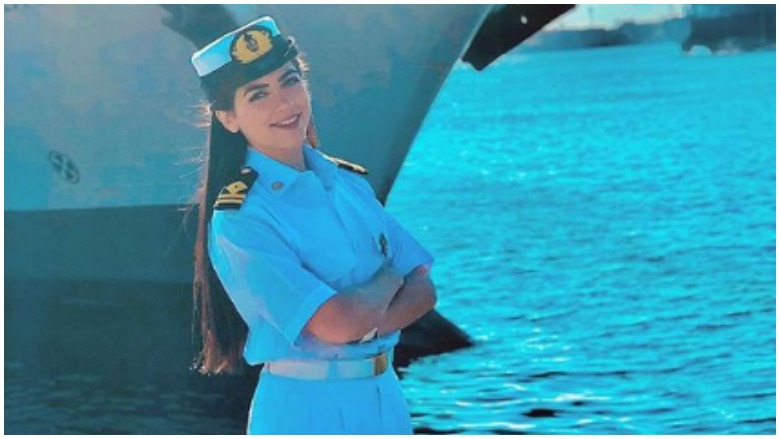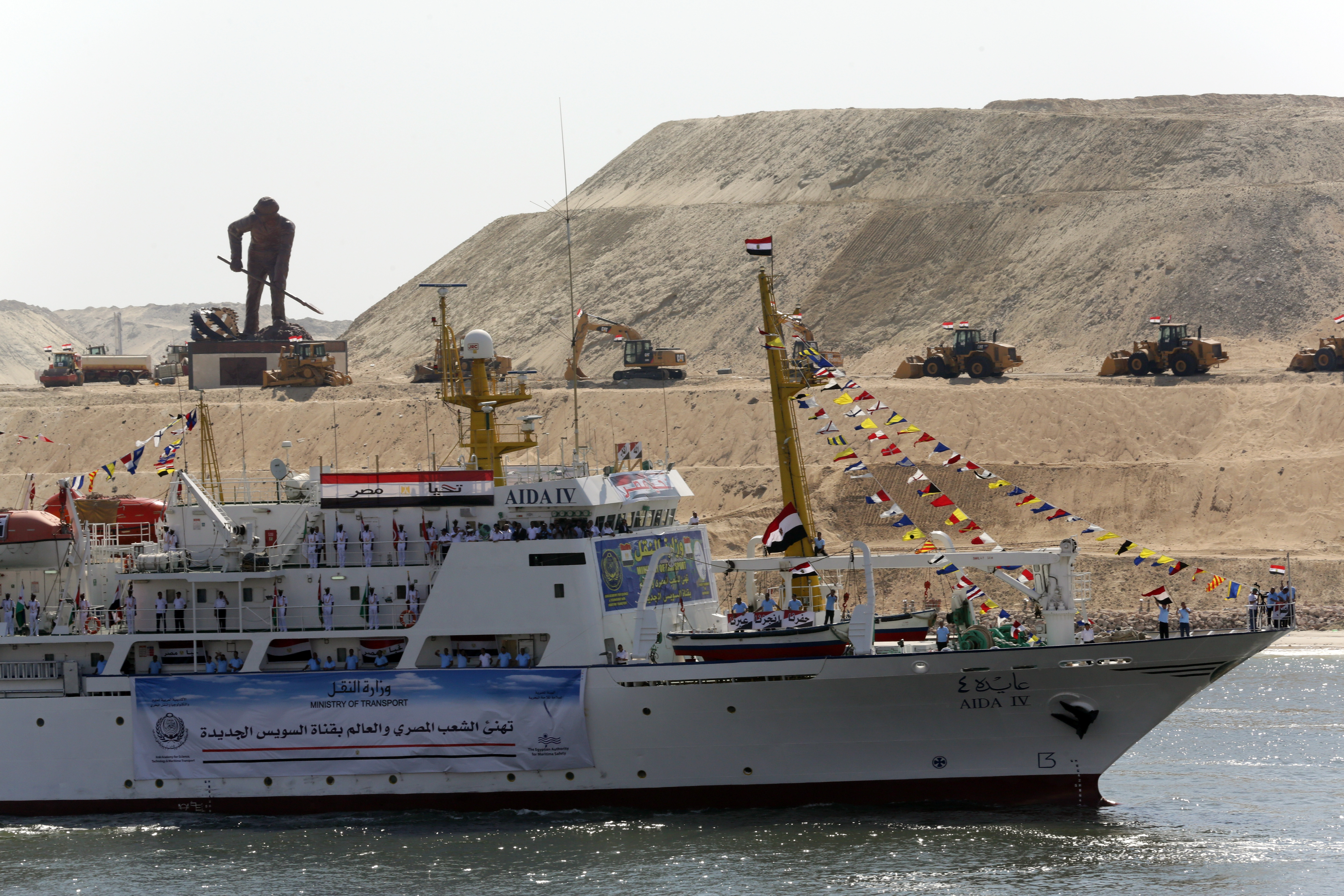
Instagram/@marwa.elselehdar Marwa Elselehdar was Egypt’s first female sea captain.
Marwa Elselehdar is the Egyptian woman who made history as the country’s first female ship captain. She recently found herself at the center of a social media hoax.
When the massive container ship the Ever Given became stuck in the Suez Canal, internet trolls blamed Elselehdar for the disaster. But as the BBC reported, Elselehdar was hundreds of miles away at the time and had nothing to do with the Ever Given.
Here’s what you need to know:
1. Elselehdar Was Working on the Aida IV in Alexandria When the Ever Given Became Stuck
Sailing through the Suez Canal from time to time is part of Elselehdar’s job. In March 2020, she posted a photo from the canal to Instagram and referred to how narrow the passageway is in the caption: “Sometimes we go through times when we feel that we are going through a tightness, but we do not see it as a passageway for crossing the open sea.”
But when the Ever Given ran aground in the Suez Canal on March 23, causing the nearly weeklong traffic jam, Elselehdar was nowhere near it. She was working as the first mate on another ship called the Aida IV in Alexandria, she told the BBC. Alexandria is located more than 200 miles away from where the Ever Given became stuck.
According to Marine Traffic, the Aida IV is a nearly 30-year-old training ship. Its most recent voyage, as of this writing, was to Port Sudan. Alexandria is its home port.
2. Elselehdar Speculates She Was Targeted for Blame Because of Her Status as a Successful Woman in a Male-Dominated Industry
Doctored headlines about Elselehdar circulated online after the Suez Canal blockage started making headlines. The Washington Post reported that the fake headline appeared to have been photoshopped onto a real article about Elselehdar’s career recently published by the Arab News.
Elselehdar says she doesn’t know who might have started the lie. But she told the BBC she has a theory as to why she became the target of the smear campaign: “I felt that I might be targeted maybe because I’m a successful female in this field or because I’m Egyptian, but I’m not sure.” According to the International Maritime Organisation, women account for only 2% of the world’s seafarers.
She said she worried about whether the false story would negatively impact her professional reputation. “This fake article was in English so it spread in other countries.”
Egypt Today Magazine was among the outlets that jumped to Elselehdar’s defense. According to Gulf Today, the outlet shared on Twitter that a post that claimed Elselehdar had caused the Suez crisis was fake news and that the online stunt “derogates Arab women’s ability to work as sea captains.”
Elselehdar says she has received a lot of support in the aftermath of the online trolling. She wrote on Instagram that she hopes to “be a source of inspiration and an example of an Arab woman who is able to assume responsibility in leadership roles.”
3. Elselehdar Was Part of the First Crew to Sail Through the Suez Canal After a Major Expansion Project Was Completed in 2015

Getty The Aida IV passes during the opening ceremony of the new Suez Canal expansion including a new 35km (22 mile) channel on August 6, 2015 in Suez, Egypt.
The Suez Canal is familiar territory for Elselehdar. She made history for an important inaugural voyage through it back in 2015.
In August 2015, an $8 billion project to expand the canal was completed. CNN, citing the Suez Canal Authority, reported at the time that the project created 45 miles of new waterways and was expected to allow for more ships, and therefore profits, to pass through.
The Aida IV became the first ship to navigate through the newly-reopened canal. Elselehdar, who was just 24 years old at the time, served as a captain on that voyage. As Arab News reported, she was the “youngest and first Egyptian female captain to cross the Suez Canal.”
She told Egyptian newspaper Al-Ahram at the time, “I never thought that my dream would finally come true. I am going to be part of the inauguration as a second naval officer on the deck of the training ship AIDA IV.”
On the significance of the canal’s expansion, she added, “I always thought this project was a major one, but I never realized we would actually witness this remarkable and extraordinary event.”
4. Egypt’s Former President Had to Grant Permission for Elselehdar to Study at the Maritime Academy
The Arab News published an in-depth profile on Elselehdar on March 20, detailing her journey to becoming Egypt’s first female shipmaster. She told the outlet she grew up swimming and always loved the ocean. That love drove her to enroll at the Arab Academy for Science, Technology and Maritime Transport.
She originally studied in the transportation and logistics department. But she was more interested in the program offered by the Department of Maritime Transport and Technology, where her brother was a student. The program traditionally only allowed men.
But Elselehdar applied anyway. Arab News said the president of the academy called for a review to ensure that no laws would be broken if the school accepted Elselehdar as a student. The BBC reported that Egypt’s then-president, Hosni Mubarak, granted permission after the legal review was complete.
Elselehdar was allowed to start the program once she had passed all of the necessary tests, just like any other student. She was the only woman out of 1,200 students in the program. She graduated in 2013.
5. Elselehdar Says She Hopes to Serve as a Role Model for Other Egyptian & Arab Women
Elselehdar admits that her journey was not easy. She told the BBC that she routinely faced sexism from people who didn’t think a woman belonged onboard the ship.
“They were all older men with different mentalities, so it was difficult not to be able to find like-minded people to communicate with,” Elselehdar said. “People in our society still don’t accept the idea of girls working in the sea away from their families for a long time. But when you do what you love, it is not necessary for you to seek the approval of everyone.”
She does, however, have the approval of her family. She told the Arab News that her parents and brother have all supported her decision to become a seafarer. Elselehdar added that she hopes to inspire other Egyptian and Arab women to pursue their own careers and dreams.